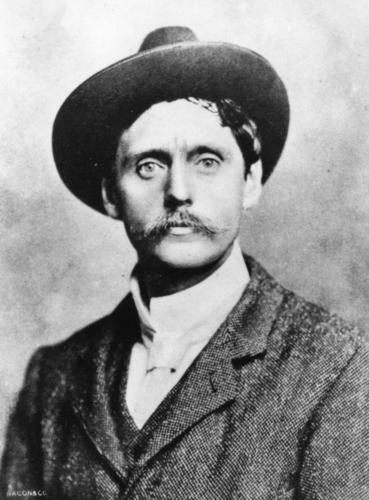Out on the wastes of the Never Never --
That's where the dead men lie!
There where the heat-waves dance forever --
That's where the dead men lie!
That's where the Earth's loved sons are keeping
Endless tryst: not the west wind sweeping
Feverish pinions can wake their sleeping --
Out where the dead men lie!
Where brown Summer and Death have mated --
That's where the dead men lie!
Loving with fiery lust unsated --
That's where the dead men lie!
Out where the grinning skulls bleach whitely
Under the saltbush sparkling brightly;
Out where the wild dogs chorus nightly --
That's where the dead men lie!
Deep in the yellow, flowing river --
That's where the dead men lie!
Under the banks where the shadows quiver --
That's where the dead men lie!
Where the platypus twists and doubles,
Leaving a train of tiny bubbles;
Rid at last of their earthly troubles --
That's where the dead men lie!
East and backward pale faces turning --
That's how the dead men lie!
Gaunt arms stretched with a voiceless yearning --
That's how the dead men lie!
Oft in the fragrant hush of nooning
Hearing again their mother's crooning,
Wrapt for aye in a dreamful swooning -
That's how the dead men lie!
Only the hand of Night can free them --
That's when the dead men fly!
Only the frightened cattle see them --
See the dead men go by!
Cloven hoofs beating out one measure,
Bidding the stockmen know no leisure --
That's when the dead men take their pleasure!
That's when the dead men fly!
Ask, too, the never-sleeping drover:
He sees the dead pass by;
Hearing them call to their friends -- the plover,
Hearing the dead men cry;
Seeing their faces stealing, stealing,
Hearing their laughter pealing, pealing,
Watching their grey forms wheeling, wheeling
Round where the cattle lie!
Strangled by thirst and fierce privation --
That's how the dead men die!
Out on Moneygrub's farthest station --
That's how the dead men die!
Hard-faced greybeards, youngsters callow;
Some mounds cared for, some left fallow;
Some deep down, yet others shallow.
Some having but the sky.
Moneygrub, as he sips his claret,
Looks with complacent eye
Down at his watch-chain, eighteen carat -
There, in his club, hard by:
Recks not that every link is stamped with
Names of the men whose limbs are cramped with
Too long lying in grave-mould, cramped with
Death where the dead men lie.
First published in
The Bulletin, 19 December 1891 and again on 21 May, 1892; 29 January 1980; 27 December 1983; and 12 May 1992;
and later in
The Coolgardie Review, 3 August 1895;
Where the Dead Men Lie and Other Poems by Barcroft Boake, 1897;
The Golden Treasury of Australian Verse edited by Bertram Stevens, 1909;
Aussie: The Australian Soldiers Magazine, April 1919;
The Oxford Book of Australian Verse edited by Walter Murdoch, 1924;
Freedom on the Wallaby: Poems of the Australian People edited by Marjorie Pizer, 1953;
A Book of Australian Verse edited by Judith Wright, 1956;
Favourite Australian Poems edited by Ian Mudie, 1963;
From the Ballads to Brennan edited by T. Inglis Moore, 1964;
The Penguin Book of Australian Verse edited by Harry Heseltine, 1972;
The Collins Book of Australian Poetry compiled by Rodney Hall, 1981;
Complete Book of Australian Folk Lore edited by Bill Scott, 1976;
The Illustrated Treasury of Australian Verse edited by Beatrice Davis, 1984;
Cross-Country: A Book of Australian Verse edited by John Barnes and Brian McFarlane, 1984;
A Treasury of Bush Verse by G. A. Wilkes, 1991;
The Penguin Book of Australian Ballads edited by Elizabeth Webby and Philip Butterss, 1993;
Australian Verse: An Oxford Anthology edited by John Leonard, 1998;
Classic Australian Verse edited by Maggie Pinkney, 2001;
Where the Dead Men Lie: The Story of Barcroft Boake, Bush Poet of the Monaro: 1866-1892 by Hugh Capel, 2002;
An Australian Treasury of Australian Verse edited by Jim Haynes, 2002;
Our Country: Classic Australian Poetry: From the Colonial Ballads to Paterson & Lawson edited by Michael Cook, 2004;
Barcroft Boake: Collected Works, Edited, with a Life edited by W. F. Refshauge, 2007;
Two Centuries of Australian Poetry edited by Kathrine Bell, 2007;
100 Australian Poems You Need to Know edited by Jamie Grant, 2008;
The Penguin Anthology of Australian Poetry edited by John Kinsella, 2009;
Macquarie PEN Anthology of Australian Literature edited by Nicholas Jose, Kerryn Goldsworthy, Anita Heiss, David McCooey, Peter Minter, Nicole Moore and Elizabeth Webby, 2009; and
The Puncher & Wattmann Anthology of Australian Poetry edited by John Leonard, 2009.
Author reference sites: Austlit,
Australian Dictionary of Biography,
Australian Poetry LibrarySee
also.

